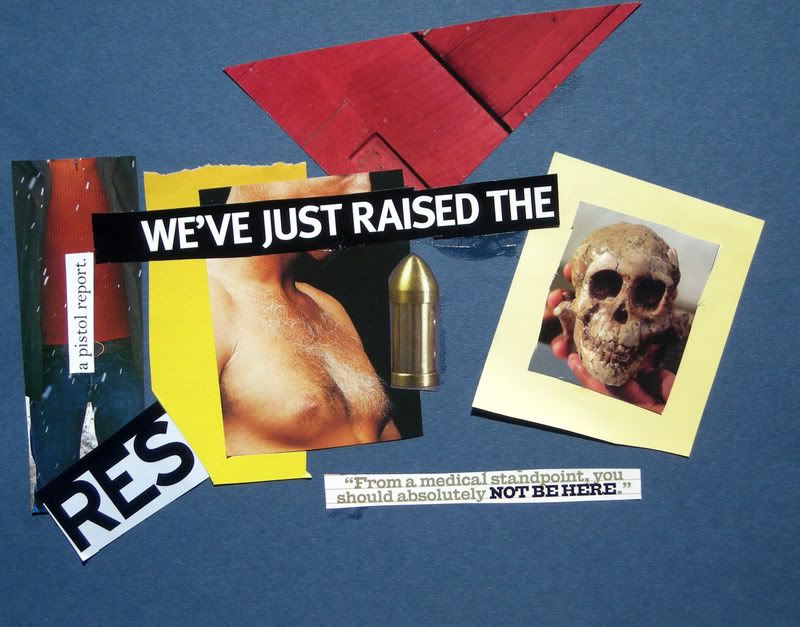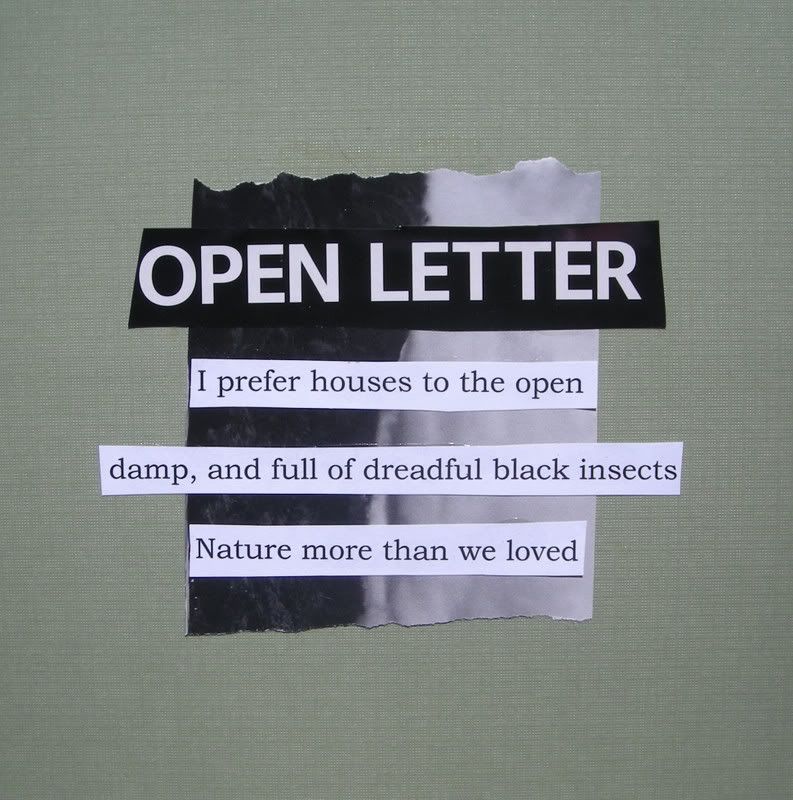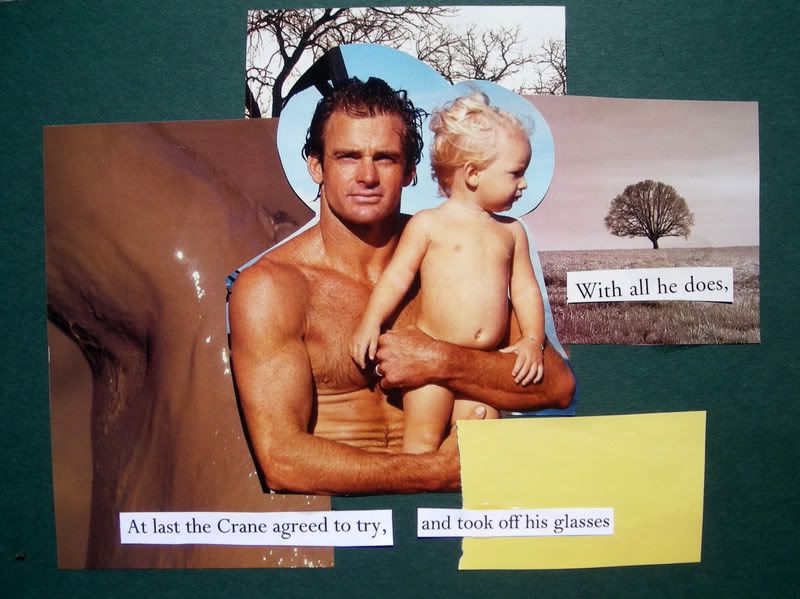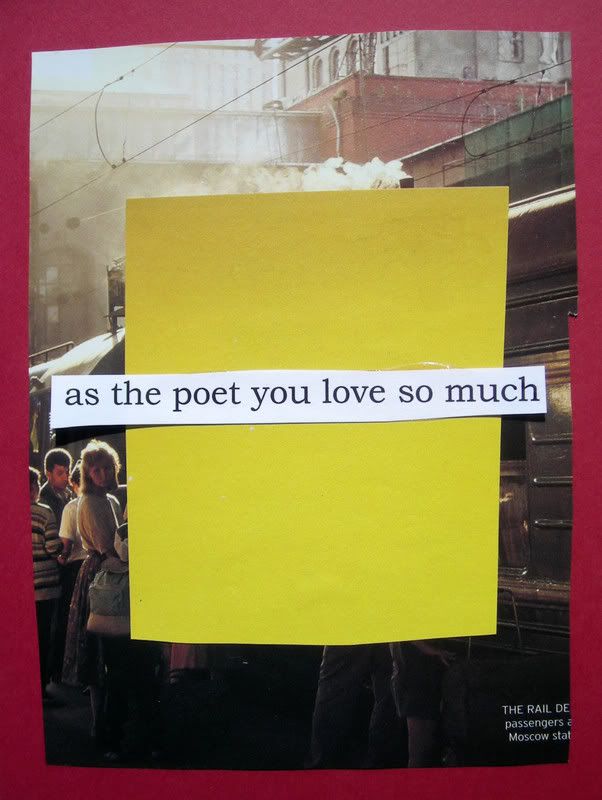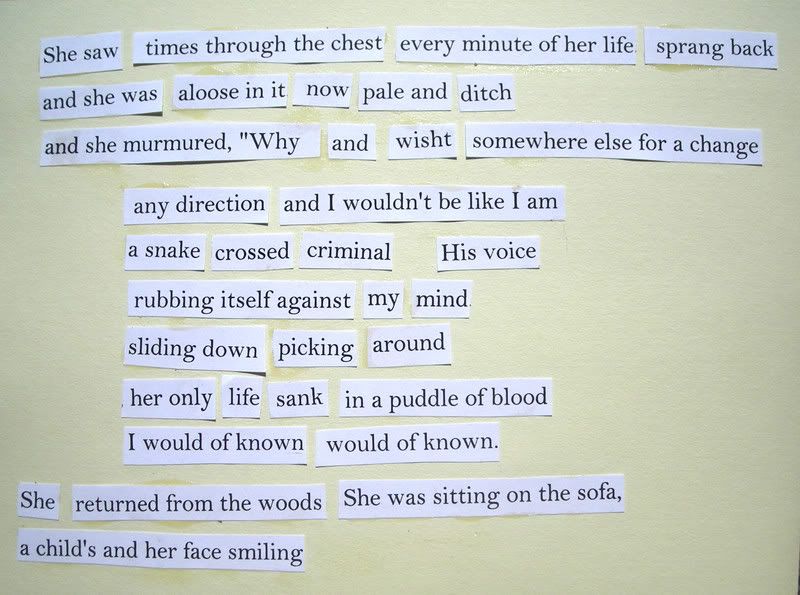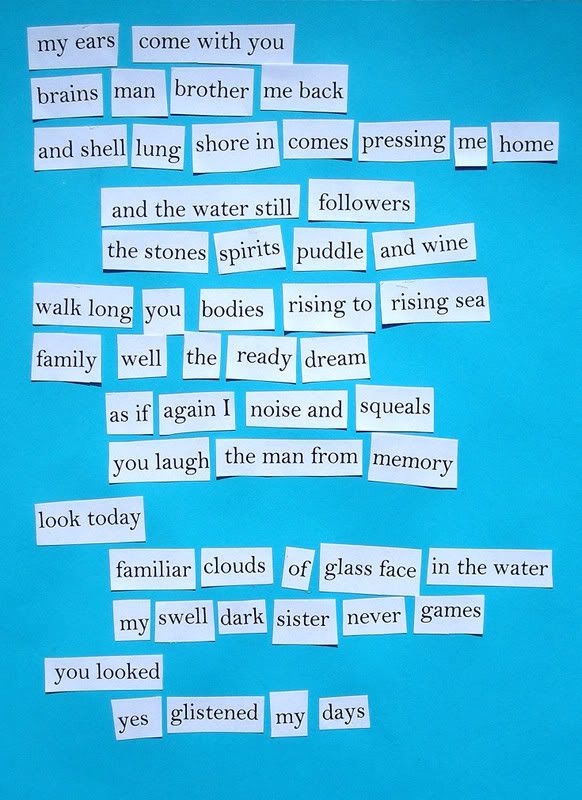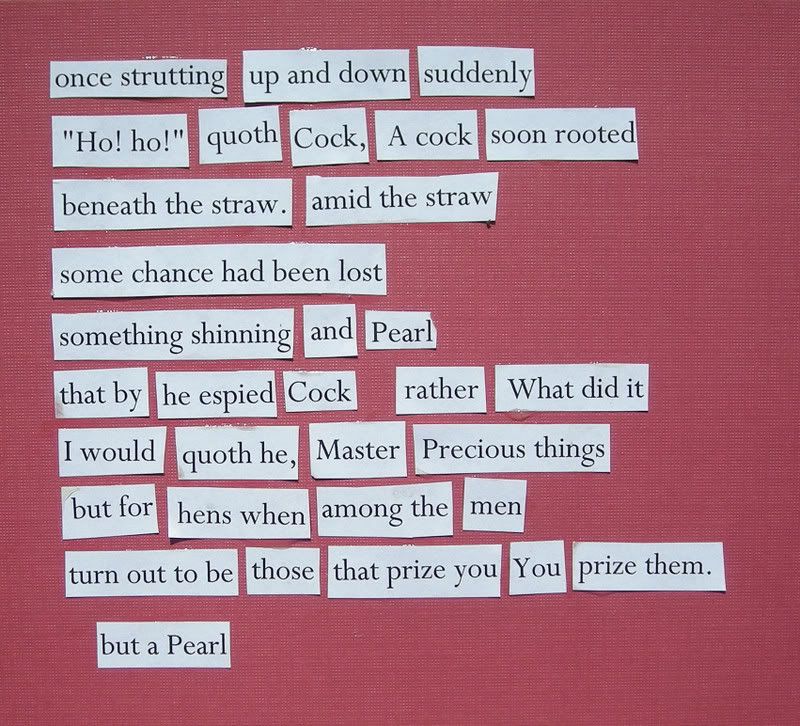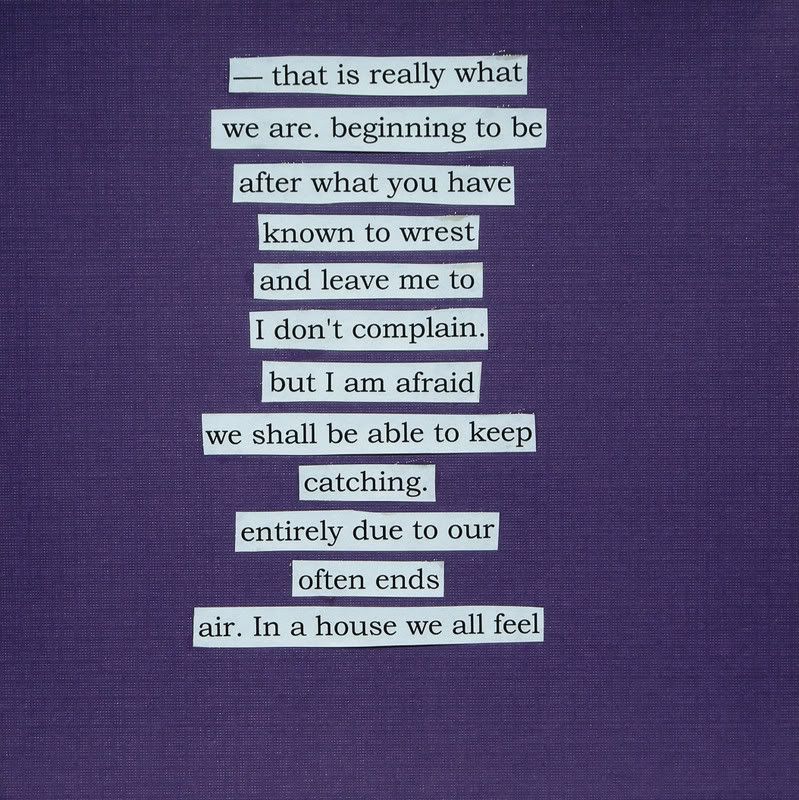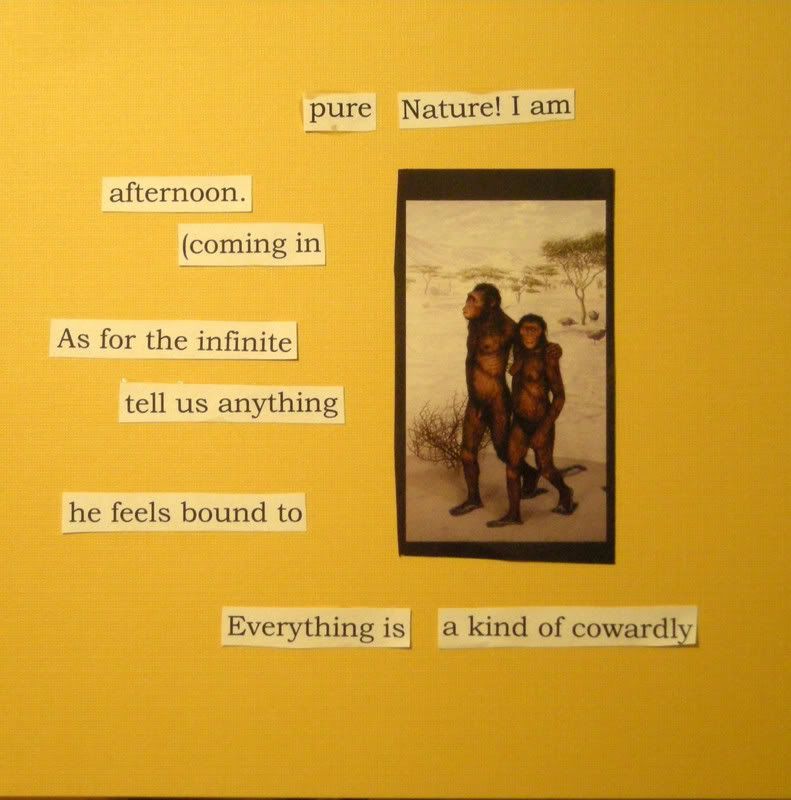Tuesday, June 26, 2007
... the more you cut the more your voice intrudes ... Bukowski: small poems that slowly build an entire Self ... maybe texts you don't know are better ... poems where the first line is a full uncut line from the text: it sets the voice, tone, line, sounds ... audio recordings to accompany ... the lesser and greater reséarches ... the short choppy poem vs the long smoothed-out poem ... you can only work for a few hours a day, then take a walk--see friends ... the first poems remain the best--why? ... "I have no Inner Resources" ... I need to be able to save work-in-progress over time and to work on serveral poems simultaneously ... have you thought about mixing texts? (Origin of Species and My Utmost For His Highest, The Elegant Universe and a Zane Grey western) ... read more Wittgenstein ...
Wednesday, June 20, 2007
20 Jun 07: some theory (the big humble work)
Collage wakes you up to the size and length of words--how long they take.
Collage wakes you up to the act of reading, of constructing while you read (the lines uneven).
Word play in collage wakes you up to the sounds of words.
Collage wakes you up to syntax--grammar becomes artistic.
We take these public words, these words that are not our own and we draw them into ourselves and we reshape them to say something truly meaningful to us... I am taking about everyday speech.
You lose yourself in someone else and find your voice still coming through. Your eye is unique and it picks out words and cuts them in your natural cadence. Yet you find yourself saying things you never would've said in ways you never thought to say them.
Words come first, then the meaning grows. Though not always. Meaning helps selection, too.
I am interested in--almost solely--emotional expression. A longing, a loss, a worry. (air in a house we all feel) We beat out our souls on these crude drums, believing we say something deep. Maybe it isn't deep at all (nature's entire lack of a plum)--maybe it is shuffling someone else's words and dealing them out again. We still speak when we know nothing. (everything is a kind of cowardly) Yet even if it isn't ontologically deep, it matters to us.
With collage you do not need to wait for inspiration to act—you dig right in and wrestle it out from the material. It halfway finds you. Revision is easy and often a surprise.
This is the big humble work. You have to understand I’m trying to say something really thoughtful here—not just thrown together but something that I really believe and mean to say. I’m thinking about people I know when I write these. I’m making philosophical and theological claims. I’m judging you. But it’s collage—scissors and glue—and what does that matter? Is this just a game, a toy?
While I work I feel very serious but when I am done I think it’s a joke.
I’m talking about human discourse. I’m talking about being human.
Collage wakes you up to the act of reading, of constructing while you read (the lines uneven).
Word play in collage wakes you up to the sounds of words.
Collage wakes you up to syntax--grammar becomes artistic.
We take these public words, these words that are not our own and we draw them into ourselves and we reshape them to say something truly meaningful to us... I am taking about everyday speech.
You lose yourself in someone else and find your voice still coming through. Your eye is unique and it picks out words and cuts them in your natural cadence. Yet you find yourself saying things you never would've said in ways you never thought to say them.
Words come first, then the meaning grows. Though not always. Meaning helps selection, too.
I am interested in--almost solely--emotional expression. A longing, a loss, a worry. (air in a house we all feel) We beat out our souls on these crude drums, believing we say something deep. Maybe it isn't deep at all (nature's entire lack of a plum)--maybe it is shuffling someone else's words and dealing them out again. We still speak when we know nothing. (everything is a kind of cowardly) Yet even if it isn't ontologically deep, it matters to us.
With collage you do not need to wait for inspiration to act—you dig right in and wrestle it out from the material. It halfway finds you. Revision is easy and often a surprise.
This is the big humble work. You have to understand I’m trying to say something really thoughtful here—not just thrown together but something that I really believe and mean to say. I’m thinking about people I know when I write these. I’m making philosophical and theological claims. I’m judging you. But it’s collage—scissors and glue—and what does that matter? Is this just a game, a toy?
While I work I feel very serious but when I am done I think it’s a joke.
I’m talking about human discourse. I’m talking about being human.
early work
I've decided to add my first collages to the beginning of the blog (scroll down):
"Goodbye California..."
"We hope this..."
Untitled (prodigal son)
"Strangely, the big humble work..."
"Goodbye California..."
"We hope this..."
Untitled (prodigal son)
"Strangely, the big humble work..."
20 Jun 07: process
Texts: I'm done with Wilde's essay for now. Because of its conversational tone it lacks vivid language, which makes for poems that sound the same. I have been finding all my texts on Project Gutenberg. I format them in Word to a large enough size to be handled and then I print them off. This, of course, limits the texts I can use to early 20th Century and prior. Also, unlike other collage work, I have control over font and font size. I don't know how I feel about that. Still looking for a good text...
Cutting: I set the fonts to 1 1/2 spacing so that I can cut them clean but this often gives me a lot of space above or below the words. Also, I rarely cut straight lines. Both of these things affect the expression of the word or phrase--though I'm still trying to feel what that is.
Pasting: I have not yet found a way to paste that makes me happy. I use rubber cement or a glue stick. The cement is often globby in a way that I can't control well. I would like to find a process where I can keep a composition without permanently mounting it so that I can make future revisions and combine poems together.
Board: This summer I've been pasting the poems onto small cardstock squares used for scrapbooking. I thought the small size would give some kind of structure to the poems but I find it too restrictive. I am interested in seeing how long I can sustain a poem.
Photos: I've found the only way to get the color right and get the image bright is to take pictures of them outside on a sunny day. Even then I have to take several to make sure one is clear enough. I do some tweaking in a photo editor before I post them. I see so much more detail when they are photos.
Cutting: I set the fonts to 1 1/2 spacing so that I can cut them clean but this often gives me a lot of space above or below the words. Also, I rarely cut straight lines. Both of these things affect the expression of the word or phrase--though I'm still trying to feel what that is.
Pasting: I have not yet found a way to paste that makes me happy. I use rubber cement or a glue stick. The cement is often globby in a way that I can't control well. I would like to find a process where I can keep a composition without permanently mounting it so that I can make future revisions and combine poems together.
Board: This summer I've been pasting the poems onto small cardstock squares used for scrapbooking. I thought the small size would give some kind of structure to the poems but I find it too restrictive. I am interested in seeing how long I can sustain a poem.
Photos: I've found the only way to get the color right and get the image bright is to take pictures of them outside on a sunny day. Even then I have to take several to make sure one is clear enough. I do some tweaking in a photo editor before I post them. I see so much more detail when they are photos.
Wednesday, June 6, 2007
6 Jun 07: notes
- First time using images. I took a stack of old issues of Scientific Americans from the library (set out for free, not stolen) but they were unfruitful for the most part. Need to find other magazines, though I'd like to avoid, say, Time or mainstream mags.
- Image was useful for drawing the poem away from the text. There is a challenge in trying to talk about something completely different than the original author. Image makes composition more important.
- "a kind of cowardly" ... like how this was pulled from context.
- "don't coop a bloom" like 'Don't cop a tude' but means 'don't hide a budding flower'
- "we study What Art" as in 'How Great Thou Art'
- "entire lack of a plum" is to mean 'plumb'... hmmm...does this come across?
- Image was useful for drawing the poem away from the text. There is a challenge in trying to talk about something completely different than the original author. Image makes composition more important.
- "a kind of cowardly" ... like how this was pulled from context.
- "don't coop a bloom" like 'Don't cop a tude' but means 'don't hide a budding flower'
- "we study What Art" as in 'How Great Thou Art'
- "entire lack of a plum" is to mean 'plumb'... hmmm...does this come across?
Subscribe to:
Posts (Atom)
